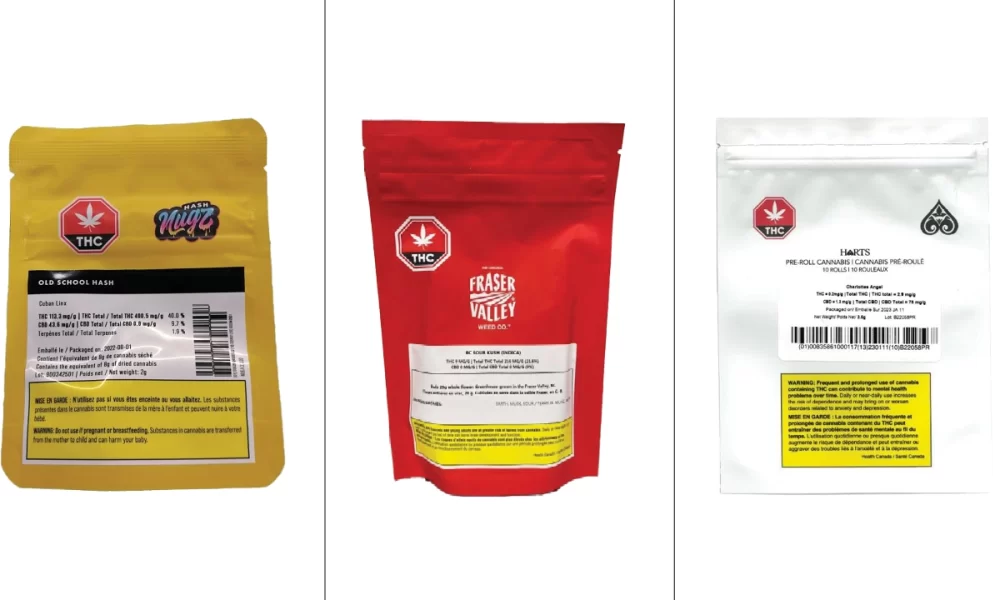Business
Why are Canadian cannabis products recalled for incorrect labels?

Since the Canadian government legalized adult-use cannabis in late 2018, cannabis product recalls have been issued 42 times.
Some of those recalls have addressed serious product defects, like potential contamination or leaky packaging.
However, most cannabis product recalls involved a far more mundane issue: 29 of them – or 69% – have involved labeling problems, according to Health Canada’s recall database.
Four-and-a-half years after Canadian adult-use sales started, the persistence of cannabis recalls for incorrect labeling raises a question for the regulated industry: Why does this keep happening?
Recalls, even for minor issues, can damage the reputations of cannabis companies and the regulated industry as a whole.
At a time when the accuracy of cannabis label claims is already under scrutiny amid reports of inflated THC claims, recalls for erroneous labels may matter more than ever.
Sherry Boodram, CEO and co-founder of Toronto-based CannDelta Consulting and a former senior inspector for Health Canada, told MJBizDaily that Canada’s “over-regulated” cannabis industry is trying to survive “a challenging economic period.”
“That includes reducing staff to streamline their business while still having to complete a large amount of paperwork that’s required to fulfill their regulatory obligations,” Boodram said.
“Despite companies having a robust quality-assurance program, which they are required to have, to avoid or limit potential manufacturing errors, at the end of the day the quality assurance and control teams are overworked, which can unfortunately cause human errors.”
Human error
The most recent recall, pre-roll multipacks from Ontario cultivator Medz Cannabis, is a straightforward example of Canadian cannabis recalls for labeling issues: The THC and CBD levels printed on the packaging were lower than the actual values in the product.
Neither Medz nor Health Canada received any complaints or adverse-reaction reports about the recalled products.
Other labeling errors that have led to cannabis recalls include:
- Not printing a mandatory warning message.
- A typo in which one one cannabinoid was incorrectly listed as another.
- Unlabeled product containers inside properly labeled exterior packaging.
- An incorrect description of a product’s intended use.
In Boodram’s experience, human error is the most common cause behind cannabis label errors.
“Mistakes can happen really at any point during the labeling process,” she said.
“It could occur during data entry, through proofreading, or even at the printing stage,” Boodram continued.
“The cannabis regulations outline very specific and nuanced packaging and labeling requirements, which means that a significant amount of oversight and review – and also checkpoints – (are) needed to ensure that the labels are compliant.”
Quality assurance expert Anuraga Mandava, chief consultant with Calgary-based Qualium Consulting, said potential errors that could lead to mislabeled cannabis include mistakes with decimal points or percentage signs, or wrongly applying information from one batch of cannabis to a different batch.
The process moves “at a fast pace; you have to get through multiple steps,” Mandava said.
“One person is wearing multiple hats – just because the cannabis industry is running on pennies right now – so there is a lot of rush to get the product out through the door,” she added.
“It’s a human thing. Mistakes happen.”
What’s at stake
Many labeling-related cannabis recalls don’t involve any adverse reaction reports, suggesting that mislabeling hasn’t posed a widespread public health issue.
In some cannabis recalls, the amount of THC listed on the label is higher than the actual amount, and weaker-than-expected cannabis is unlikely to pose a health risk to recreational consumers.
“But from the producer’s perspective, we know that the cannabis industry is still being heavily scrutinized by the public,” cannabis consultant Boodram said.
“That creates a larger negative public perception of the industry as a whole — in addition to the negative perception and mistrust, probably, of the producer themselves,” she continued.
Labeling recalls can also hurt the producer’s business-to-business relationships, especially if they’re recurring, Boodram noted.
“It shows that there could be a lack of quality control or reliability in their process, which could impact their overall relationship and even relationships with provincial (cannabis wholesale) boards and their vendors,” she said.
Qualium Consulting’s Mandava noted: “Everything runs on brand image and reputation, especially in the cannabis industry.”
Recalls, even for something as simple as a missing percentage sign or decimal point on a label, “give a bad impression that, ‘These guys don’t have everything buttoned up.’”
Best practices
CannDelta’s Boodram advises cannabis companies to “regularly review their internal processes, including their labeling process, to make sure that there are enough checkpoints in place” to prevent labeling errors from happening.
“That includes assessing if they have the right team in place to (operate) those checkpoints, that are qualified and experienced enough to be able to detect deficiencies or errors.”
Having enough workers can also help prevent human error related to stress and burnout, Boodram added.
“Sometimes you need a second set of eyes, especially with the labels. There’s so much information and nuance in that label that you need to check for,” Boodram added.
“You really can’t have one person checking it, you need to have multiple people to make sure that the first person didn’t miss something.”
Boodram said staff training on standard operating procedures also plays an important role.
Quality assurance expert Mandava said enterprise resource planning (ERP) software can help automate the labeling process.
However, she noted that ERP software can be expensive.
Like Boodram, Mandava recommended appropriate standard operating procedures backed up by checklists and redundancies.
“You have one person adding the information, and another person reviewing it, and another person confirming it,” she said.
Source: https://mjbizdaily.com/why-canadian-cannabis-products-are-recalled-for-incorrect-labels/